#Salesforce AI Experts
Explore tagged Tumblr posts
Text
Boost Your Business with Salesforce Sales and Service Cloud Services!
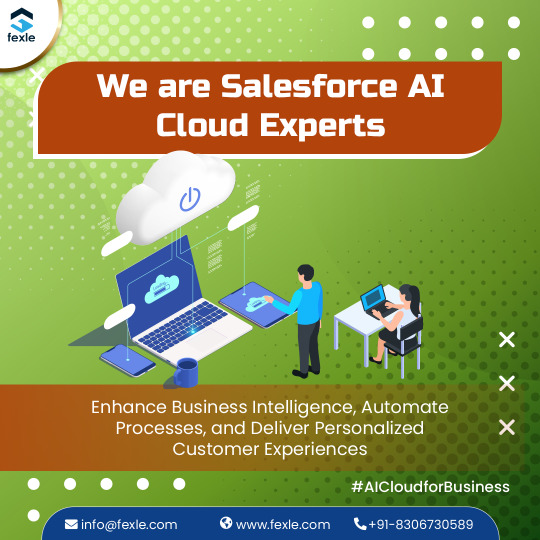
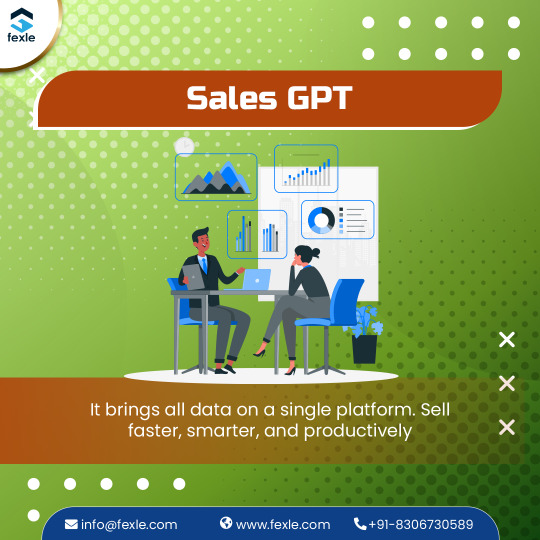
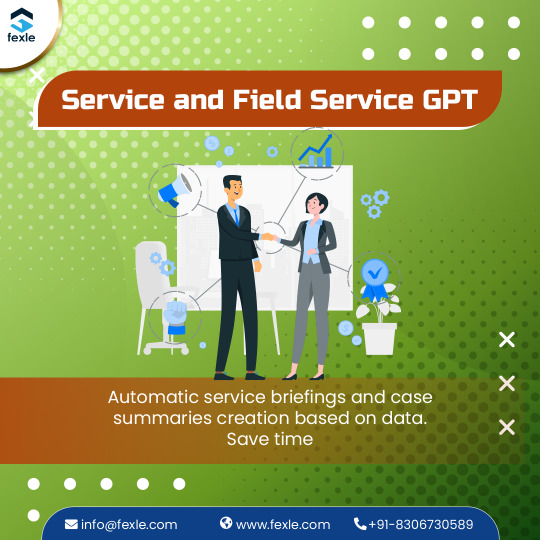
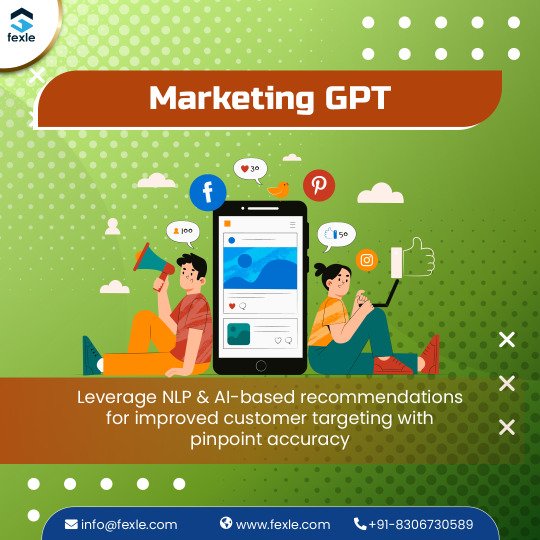
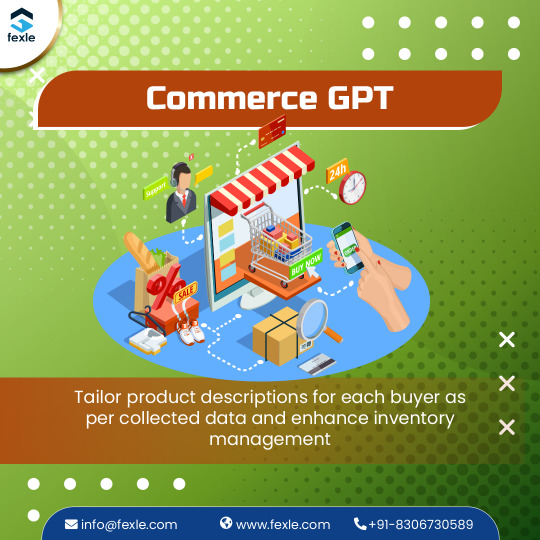
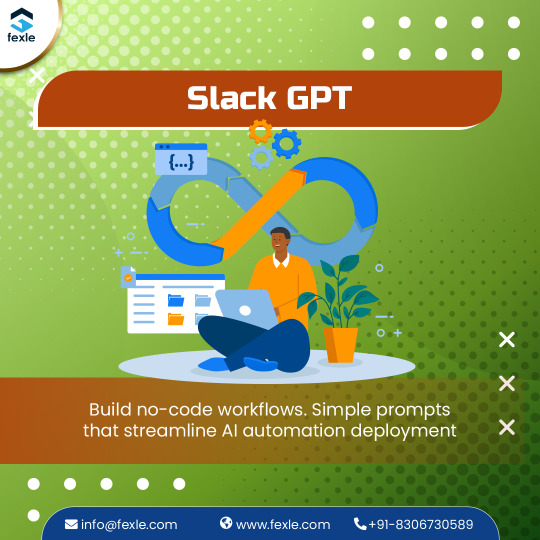
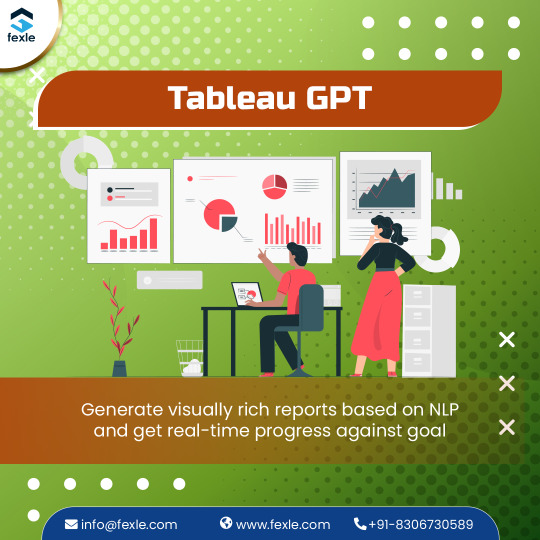

Looking to transform your business operations with Salesforce Sales Cloud implementation services and Service Cloud integration solutions? FEXLE Services, a leading Salesforce consulting company in the USA and India, is your trusted partner.
Our experienced team of Salesforce consultants is proficient in delivering top-notch Sales Cloud and Service Cloud solutions. We help you enhance your business productivity, boost revenue, and improve business visibility. With Sales Cloud, we accelerate sales productivity, generate new leads, close deals faster, and provide invaluable insights.
Our custom Service Cloud implementation services empower your customer service agents with productivity tools, allowing them to track customer case history, manage dashboards, and respond to customer needs swiftly. This leads to increased profits, customer loyalty, and agent satisfaction, ensuring top-quality services.
Hire our Salesforce Sales/Service Cloud consultants to empower your sales and service teams, enabling them to make quicker and more informed decisions. Contact Fexle Services today and take your business to new heights with Salesforce solutions.
Learn More Here
#salesforce consulting services#fexle#salesforce#salesforce gold partner#crm consulting#salesforce development services#Salesforce AI Experts#sales and service cloud
0 notes
Text
Grow your business quicker and better with Salesforce CRM!
Hey there! 🌟 Ever wondered how some businesses are so good at selling and growing? Well, guess what? Our awesome guide on Salesforce CRM has all the answers! It's like having a secret tool that helps your business be the best it can be. Want to know more? We've got tips and tricks from experts that make using Salesforce CRM easy-peasy. So, are you ready to level up your business game? Don't miss out on this chance to make your business shine! Talk to IT Solutions Solved now and let's get started on your CRM!
#salesforce#salesforce crm#salesforce automation#crm consultancy#it solutions solved#crm consulting#crm consulting services#expert crm consulting services#zoho partner in australia#crm consultant in melbourne#best crm agency#how to implement crm#crm in australia#IT#AI#Software#technology
0 notes
Text
Explore how cloud migration services, cloud platform development, cloud application development, custom AI solutions, and custom Salesforce development solutions converge to drive business transformation and innovation in the digital era.
#cloud migration service#cloud platform development#cloud application development#custom ai and machine learning solutions#custom ai solutions#custom salesforce development solutions#certified salesforce experts
0 notes
Text
SACRAMENTO, Calif. (AP) — California Gov. Gavin Newsom signed three bills Tuesday to crack down on the use of artificial intelligence to create false images or videos in political ads ahead of the 2024 election.
A new law, set to take effect immediately, makes it illegal to create and publish deepfakes related to elections 120 days before Election Day and 60 days thereafter. It also allows courts to stop distribution of the materials and impose civil penalties.
“Safeguarding the integrity of elections is essential to democracy, and it’s critical that we ensure AI is not deployed to undermine the public’s trust through disinformation -– especially in today’s fraught political climate,” Newsom said in a statement. “These measures will help to combat the harmful use of deepfakes in political ads and other content, one of several areas in which the state is being proactive to foster transparent and trustworthy AI.”
Large social media platforms are also required to remove the deceptive material under a first-in-the-nation law set to be enacted next year. Newsom also signed a bill requiring political campaigns to publicly disclose if they are running ads with materials altered by AI.
The governor signed the bills to loud applause during a conversation with Salesforce CEO Marc Benioff at an event hosted the major software company during its annual conference in San Francisco.
The new laws reaffirm California’s position as a leader in regulating AI in the U.S., especially in combating election deepfakes. The state was the first in the U.S. to ban manipulated videos and pictures related to elections in 2019. Measures in technology and AI proposed by California lawmakers have been used as blueprints for legislators across the country, industry experts said.
With AI supercharging the threat of election disinformation worldwide, lawmakers across the country have raced to address the issue over concerns the manipulated materials could erode the public’s trust in what they see and hear.
“With fewer than 50 days until the general election, there is an urgent need to protect against misleading, digitally-altered content that can interfere with the election,” Assemblymember Gail Pellerin, author of the law banning election deepfakes, said in a statement. “California is taking a stand against the manipulative use of deepfake technology to deceive voters.”
Newsom’s decision followed his vow in July to crack down on election deepfakes in response to a video posted by X-owner Elon Musk featuring altered images of Vice President and Democratic presidential nominee Kamala Harris.
The new California laws come the same day as members of Congress unveiled federal legislation aiming to stop election deepfakes. The bill would give the Federal Election Commission the power to regulate the use of AI in elections in the same way it has regulated other political misrepresentation for decades. The FEC has started to consider such regulations after outlawing AI-generated robocalls aimed to discourage voters in February.
Newsom has touted California as an early adopter as well as regulator of AI, saying the state could soon deploy generative AI tools to address highway congestion and provide tax guidance, even as his administration considers new rules against AI discrimination in hiring practices.
He also signed two other bills Tuesday to protect Hollywood performers from unauthorized AI use without their consent.
8 notes
·
View notes
Text
The Future of Digital Marketing in 2025 – Trends Every Business Must Adopt
Introduction
As we step into 2025, digital marketing is evolving at an unprecedented pace. Businesses that stay ahead of trends will increase brand visibility, attract more leads, and boost conversions. From AI-driven SEO to hyper-personalized marketing, the digital landscape is more competitive than ever.
Whether you’re a small business owner, entrepreneur, or marketing professional, understanding these trends will help you craft a winning digital marketing strategy. Let’s explore the top digital marketing trends for 2025 that will shape the future of online success.
1. AI-Powered SEO is the Future
Search engines are becoming smarter and more intuitive. With AI-powered algorithms like Google’s MUM (Multitask Unified Model) and BERT (Bidirectional Encoder Representations from Transformers), traditional SEO tactics are no longer enough.
How AI is Transforming SEO in 2025?
✔ AI-driven content creation: Advanced AI tools analyze search intent to create highly relevant, optimized content. ✔ Predictive analytics: AI predicts user behavior, helping businesses optimize content for better engagement. ✔ Voice and visual search optimization: As voice assistants like Siri, Alexa, and Google Assistant become more popular, brands must adapt their SEO strategy to long-tail conversational queries.
Actionable Tip: Optimize for natural language searches, use structured data markup, and ensure website accessibility to improve rankings in 2025.
2. Video Marketing Continues to Dominate
With platforms like TikTok, Instagram Reels, and YouTube Shorts, video marketing is becoming the most powerful form of content in 2025.
Why is Video Marketing Essential?
📌 80% of internet traffic will be video content by 2025 (Cisco Report). 📌 Short-form videos increase engagement and hold attention longer than static content. 📌 Live streaming and interactive videos help brands connect with audiences in real-time.
Actionable Tip: Focus on storytelling, behind-the-scenes content, product demonstrations, and influencer collaborations to boost engagement.
3. Hyper-Personalization with AI & Data Analytics
Consumers expect highly personalized experiences, and AI-powered marketing automation makes it possible.
How Does Hyper-Personalization Work?
✔ AI analyzes customer behavior and past interactions to create tailored marketing messages. ✔ Email marketing campaigns are dynamically personalized based on user interests. ✔ Chatbots and voice assistants provide real-time, customized support.
Actionable Tip: Leverage tools like HubSpot, Salesforce, and Marketo to automate personalized marketing campaigns.
4. Influencer Marketing Becomes More Authentic
The influencer marketing industry is projected to reach $21.1 billion by 2025. However, brands are shifting from celebrity influencers to micro and nano-influencers for better authenticity and engagement.
Why Micro-Influencers Matter?
🎯 Higher engagement rates than macro-influencers. 🎯 More trust & relatability with niche audiences. 🎯 Cost-effective collaborations for brands with limited budgets.
Actionable Tip: Partner with influencers in your niche and use user-generated content (UGC) to enhance brand credibility.
5. Voice & Visual Search Optimization is a Must
By 2025, 50% of all searches will be voice or image-based, making traditional text-based SEO insufficient.
How to Optimize for Voice & Visual Search?
✔ Use long-tail keywords & conversational phrases. ✔ Optimize images with alt text & structured data. ✔ Ensure your site is mobile-friendly and fast-loading.
Actionable Tip: Implement Google Lens-friendly content to appear in image-based search results.
Conclusion
The future of digital marketing in 2025 is driven by AI, personalization, and immersive experiences. If you’re not adapting, you’re falling behind!
Looking for expert digital marketing strategies? Mana Media Marketing can help you grow and dominate your niche. Contact us today!
2 notes
·
View notes
Text

Looking for expert Salesforce AI consulting partner in New Jersey? Codinix specializes in AI-powered CRM solutions tailored to your business needs. From customization and seamless integration to expert guidance and ongoing support, we ensure a smooth and efficient Salesforce AI implementation.
🚀 Why Choose Codinix? ✔ Customized Salesforce AI solutions ✔ Seamless integration with existing systems ✔ On-time, budget-friendly deployment ✔ Ongoing support & proactive issue resolution
Transform your business with Salesforce AI! Contact Codinix today.
Call us now: +1 (771) 333-2222, +91 (881) 485-2222 and mail us at: [email protected] For more info visit us at: www.codinix.com/salesforce-ai-consulting-partner-new-jersey
2 notes
·
View notes
Text
How MuleSoft IDP Ensures Secure & Compliant Intelligent Document Processing
Discover how MuleSoft Intelligent Document Processing (IDP) enhances security, encryption, and compliance for handling sensitive business data. Learn about access controls, data retention policies, AI security, and seamless Salesforce integration with expert MuleSoft Salesforce Integration Services. Stay ahead with robust document security solutions. 🔐
2 notes
·
View notes
Text
Last year was, by all accounts, a bloodbath for the tech industry, with more than 260,000 jobs vanishing — the worst 12 months for Silicon Valley since the dot-com crash of the early 2000s.
Executives justified the mass layoffs by citing a pandemic hiring binge, high inflation and weak consumer demand.
Now in 2024, tech company workforces have largely returned to pre-pandemic levels, inflation is half of what it was this time last year and consumer confidence is rebounding.
Yet, in the first four weeks of this year, nearly 100 tech companies, including Meta, Amazon, Microsoft, Google, TikTok and Salesforce have collectively let go of about 25,000 employees, according to layoffs.fyi, which tracks the technology sector.
. . .
"The layoffs seem to be helping their stock prices, so these companies see no reason to stop."
"Google and the rest of Big Tech are betting big on AI while cutting back on non-strategic areas. Layoffs will continue to happen for Big Tech in some areas while the hiring frenzy in AI will be unprecedented as this arms race continues across the tech world," Dan Ives, managing director at Wedbush Securities, told CNBC.
. . .
Other companies too are looking to cut jobs to focus on their AI-driven businesses.Vroom would axe about 800 jobs, according to the U.S.-based online used-car marketplace's regulatory filing last week, as it plans to focus on automotive financing and AI services and close its e-commerce and used-vehicle dealership businesses.Earlier this month, media reports said Duolingo would cut 10% of its contractors as the language-learning app moves toward using AI to create content.
2 notes
·
View notes
Text
Comparing the Best CRM Platforms: Salesforce, HubSpot, Zoho & More

In today’s competitive business environment, Customer Relationship Management (CRM) software is no longer a luxury — it's a necessity. With so many CRM platforms available, choosing the right one for your business can be overwhelming. In this blog, we’ll compare some of the best CRM solutions on the market — Salesforce, HubSpot, Zoho CRM, and a few other notable contenders — to help you make an informed decision.
1. Salesforce CRM: The Enterprise Leader
Overview: Salesforce is one of the most powerful and widely used CRMs in the world. Known for its scalability and robust customization, it caters primarily to medium and large enterprises.
Key Features:
Advanced automation and workflow management
AI-powered insights with Salesforce Einstein
Extensive third-party app marketplace (AppExchange)
Highly customizable dashboards and reports
Pros:
Industry-leading innovation and integrations
Ideal for complex sales processes and large teams
Strong partner ecosystem and support
Cons:
Steep learning curve
Can be expensive for small businesses
Best For: Enterprises needing full-featured, customizable CRM systems.
2. HubSpot CRM: The User-Friendly All-Rounder
Overview: HubSpot CRM is known for its simplicity, clean interface, and free plan. It’s especially popular among startups, SMBs, and marketing-focused teams.
Key Features:
Free core CRM with optional paid marketing, sales, and service tools
Email tracking and marketing automation
Easy pipeline and deal tracking
Integrated live chat and chatbot tools
Pros:
Intuitive interface and ease of use
Free tier available with generous features
Seamless integration with HubSpot’s marketing suite
Cons:
Limited customization on free/entry-level plans
Costs can add up quickly as you scale
Best For: Startups, small businesses, and marketing-driven organizations.
3. Zoho CRM: The Cost-Effective Powerhouse
Overview: Zoho CRM is a flexible, affordable solution with a rich set of features for businesses of all sizes. It offers strong automation and integration capabilities.
Key Features:
Sales automation and AI-powered predictions
Omnichannel communication (email, social, phone, chat)
Custom modules and layout options
Integration with Zoho’s broader suite (Books, Projects, Campaigns, etc.)
Pros:
Excellent value for money
High level of customization
Strong mobile app and multilingual support
Cons:
UI can feel cluttered for new users
Some advanced features locked behind higher tiers
Best For: SMBs and growing businesses looking for flexibility on a budget.
4. Other Notable CRM Platforms
a. Pipedrive
Sales-focused CRM with a visual pipeline
Great for smaller sales teams and solo entrepreneurs
Affordable with strong email integration and reporting tools
b. Freshsales (by Freshworks)
AI-based lead scoring and email tracking
Integrated phone, email, and chat
Good for startups and SaaS businesses
c. Microsoft Dynamics 365 CRM
Enterprise-grade CRM with deep Microsoft Office and Teams integration
Ideal for businesses already using Microsoft products
Conclusion: Which CRM Is Right for You?
There’s no one-size-fits-all CRM. The best platform depends on your business size, goals, and budget.
CRM Platform
Best For
Price Range
Salesforce
Large enterprises with complex needs
$$$$
HubSpot
Startups and marketing teams
Free to $$$
Zoho CRM
SMBs needing customization & value
$$
Pipedrive
Sales-driven small businesses
$$
Freshsales
Startups wanting AI & omnichannel support
$$
Microsoft Dynamics
Enterprises using Microsoft ecosystem
$$$$
Before making your decision, consider doing a free trial of two or three CRMs to evaluate their user experience and capabilities.
Need help choosing or implementing the Best CRM Solutions for your business? Reach out to our experts today for a personalized consultation.
0 notes
Text
AI vs Human Negotiation: Can Algorithms Close Billion-Dollar Deals?

Today, we’re here to talk about the never-ending debate: AI vs Human. There’s a lot of buzz still going on about AI being superior to the human brain & the fear of loss of jobs among humans. Undoubtedly, AI gives us roadmaps as an invaluable tool that transforms several aspects of the working fields day in & day out. A necessary people skill in these fields of work is negotiation skills. Experts are still on the verge of solving the mystery of AI being able to negotiate business deals the way humans do. For now it AI vs human is an unending topic.
The Evolution of Deal-Making in the AI Era
Negotiation has long been considered a human art. It requires emotional intelligence, cultural nuance, and the ability to read between the lines. However, recent advancements in AI have given rise to negotiation bots that can analyze enormous datasets, assess counterpart behavior patterns, and optimize deal strategies in real time. From Salesforce and IBM to startups like Pactum and Lexion, automated negotiation tools are making headway across industries.
According to a report from Deloitte, over 40% of U.S. enterprises are exploring AI-powered contract negotiation platforms. These systems are not just parsing legal text; they are evaluating risk, forecasting outcomes, and even recommending counteroffers. But while the AI vs human debate intensifies, there is a growing recognition that each has unique advantages that can be leveraged strategically.
Where AI Excels: Speed, Scale, and Data-Driven Precision

[Source - Freethink]
AI thrives in environments where structure, scale, and data abundance prevail. It can rapidly scan through thousands of contract clauses, benchmark them against industry standards, and calculate optimal outcomes with machine-level accuracy. In large procurement deals or licensing agreements involving standardized terms, AI delivers speed and consistency that humans can't match.
Take, for example, Walmart's use of Pactum to renegotiate supplier contracts. The AI-driven platform closed deals faster and more efficiently than human teams, yielding a 3% to 5% savings margin across select categories.
Moreover, AI systems are free from emotional bias—they don't get tired, flustered, or personally invested. They can crunch numbers, predict behaviors using historical data, and recommend negotiation paths based on statistical modeling.
The Human Advantage: Intuition, Empathy, and Complex Judgment
Yet when the stakes rise and complexity deepens, human negotiators still hold the upper hand. Billion-dollar M&A deals, strategic partnerships, or regulatory settlements often involve delicate human dynamics. Understanding a counterpart's unspoken concerns, decoding political undercurrents, or adapting to shifting interpersonal cues are areas where AI still falls short.
AI vs human negotiations in these contexts are not just about logic, but trust. CEOs and executive stakeholders rarely sign on the dotted line because an algorithm suggested a favorable term. They do so because of relationships built on credibility, transparency, and shared vision—attributes that remain distinctly human.
Consider Amazon's acquisition of Whole Foods. Beyond numbers and synergies, the deal involved leadership alignment, cultural fit, and long-term brand strategy. It's hard to imagine an algorithm capturing the essence of such factors.
Hybrid Models: The Future of Intelligent Negotiation

[ - Source - CIO Africa]
The most effective approach may not be a binary choice but a hybrid model where AI augments human expertise. In such systems, AI handles the heavy lifting—data analysis, document preparation, risk scoring—while humans steer the strategic dialogue.
For instance, IBM Watson has been integrated into legal teams to support contract reviews and generate smart negotiation clauses. Meanwhile, human negotiators use those insights to formulate nuanced positions and craft persuasive arguments.
This AI vs human collaboration enables businesses to scale negotiations without sacrificing personalization. According to a McKinsey report, companies leveraging AI-human hybrid negotiation strategies see up to 25% faster deal cycles and 15% higher close rates.
Challenges and Ethical Considerations
With great technological power comes ethical responsibility. One challenge in AI vs human negotiations is transparency. If one party is using AI and the other isn’t, does that create an asymmetry in power? Should AI declare itself as a negotiation participant? What about accountability when an AI-led deal results in loss or dispute?
These are real concerns. The U.S. Chamber of Commerce has begun advocating for ethical frameworks to ensure AI usage in commercial negotiations adheres to principles of fairness, privacy, and consent.
Moreover, regulatory environments are evolving. In sectors like healthcare, defense, and finance, human oversight is not just preferred—it's mandated. AI may assist, but human decision-makers must remain in control.
U.S. Business Leaders Weigh In
According to a recent Forbes survey, 63% of U.S. C-suite executives believe AI will become an essential part of their negotiation strategy within the next five years. However, 72% also believe that AI can never fully replace the human element, especially in complex or relationship-driven deals.
Startup founders echo similar sentiments. Many are using AI to gain negotiation intelligence but still rely on experienced advisors, mentors, and executives to lead discussions.
As one Silicon Valley founder noted, "AI gives me the playbook, but it’s still my voice that seals the deal."
Conclusion:
The future of negotiation isn’t about AI vs human supremacy. It's about synergy. AI brings speed, scale, and predictive power, while humans bring empathy, judgment, and the emotional intelligence needed for trust-building. In billion-dollar deals where reputations, cultures, and legacies are on the line, it's unlikely that AI will ever completely take over. But as a co-pilot in the negotiation room, AI is already proving to be a powerful ally.
The companies that will lead the next era of business negotiation are those that stop asking whether to choose AI vs human and start exploring how to combine both for smarter, faster, and more strategic deal-making.
Uncover the latest trends and insights with our articles on Visionary Vogues
0 notes
Text
Why Your Customer Service Chatbot Is Driving Customers Away (And How to Fix It)
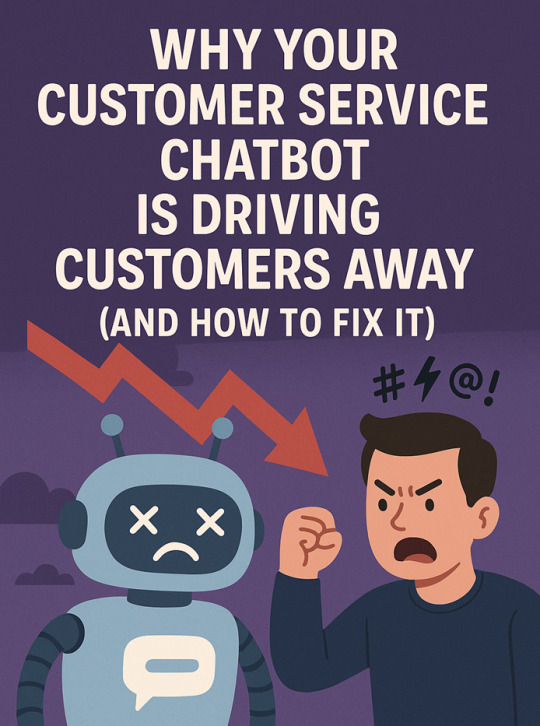
Imagine this: a customer visits your site in a panic. Their order didn’t arrive, and they're leaving for a trip tomorrow. They click the chat icon, hoping for help. Instead, they’re trapped in a loop:
“Hi! I’m your helpful assistant. Please choose one of the following options.”
None of the options address their issue. There’s no escape hatch. No agent. Just a friendly robot making them angrier by the second. By the time they leave, your chatbot hasn’t just failed to help — it’s actively damaged your brand.
Welcome to the dark side of poorly designed chatbots for customer service.
The Real Problem: Misaligned Expectations
Too often, businesses implement chatbots thinking of cost savings, not customer experience. They treat the chatbot as a ticket deflector, not a support assistant. But customers don’t see it that way.
To them, a chatbot is your brand’s promise to help — instantly, reliably, and personally. When it breaks that promise, the betrayal cuts deeper than a delayed email response. It feels like no one’s listening.
And customers remember how you made them feel, not how much you saved in support costs.
✅ Stat Check: A Salesforce study found that 69 percent of customers prefer chatbots for quick communication — but only when they work. Poorly executed bots can cause up to a 30 percent drop in satisfaction scores.
Case Study: The eCommerce Brand That Lost $50K Before Fixing Its Bot
A U.S.-based mid-sized eCommerce company (about 60 employees), selling premium electronics, launched a chatbot to reduce customer support load by 40 percent in Q1.
But within just 60 days, things unraveled:
23 percent drop in customer satisfaction
Surge in product return requests
$50,000 in estimated revenue loss due to abandoned carts
Customers typed questions like:
“Can I return this if I opened the box but didn’t use the product?”
The bot’s response?
❌ "Our return policy is 14 days for unopened items. For more info, visit our FAQ page."
Frustrated users left, often posting complaints publicly. The support team became overwhelmed, and loyalty took a hit.
How They Fixed It
They partnered with a conversational AI expert, retrained the bot with real customer support data, and improved fallback logic. Now, the bot responds:
✅ “I see you’re asking about opened returns — let me bring in a support expert to confirm your options.”
Within six weeks:
Customer satisfaction rebounded by 18 percent
Product return queries dropped by 30 percent
Repeat purchase rate improved by 12 percent
Tools like Sitebot reinforce this shift: chatbots for customer service must be trained with real customer intent in mind, not assumptions.
When a Chatbot Saves the Day
A SaaS company selling invoicing tools discovered most support queries spiked after feature updates. Rather than relying on generic answers, they configured their chatbot to respond based on update context.
When a user asked:
“Why is my report layout different?”
The bot replied:
✅ “We’ve just rolled out a new dashboard layout for easier tracking. Want a quick video walkthrough or to speak with a support agent?”
This helped reduce confusion, increase engagement, and boost retention.
Quick Diagnostic: Is Your Chatbot Hurting or Helping?
Ask yourself:
Does it understand intent, or just scan for keywords?
Is there escalation to a human after one or two failed replies?
Are the responses genuinely helpful — or just hyperlinks to FAQs?
Is it updated based on customer feedback?
Is the experience optimized for mobile users as well?
If your answer is “no” to even two, it’s time to review your strategy.
5 Questions to Ask Before (Re)Launching
Are we training it with real-world support tickets?
Does it provide clarity, not confusion?
Do we have clear KPIs beyond “ticket reduction”?
Who owns performance — CX, product, or marketing?
Are we using feedback loops to retrain it monthly?
Platforms like Sitebot let teams approach chatbot deployment with CX-first thinking, turning automation into an asset — not a liability.
Trends to Watch in Chatbot Tech
The world of chatbots for customer service is moving fast. Here are two trends shaping the next phase:
AI Voice Integration: Voice-enabled bots are making self-service more natural and accessible.
Sentiment Analysis: Bots are now learning to detect tone and escalate emotionally charged conversations faster.
For more, Gartner’s chatbot trend report is worth bookmarking as AI capabilities mature.
Conclusion: Fix the Bot Before It Breaks Your Brand
It’s easy to fall into the trap of thinking automation solves everything. But chatbots for customer service are not replacements for empathy. They’re amplifiers — of either frustration or satisfaction.
If you treat your chatbot like a static script, your customers will too.
If you treat it like a living, learning support teammate — retrained regularly, monitored thoughtfully, and given space to escalate — it will reward you with lower support costs and happier customers.
✅ According to IBM, companies can reduce service costs by up to 30 percent while improving resolution times — if the chatbot is trained on real customer behavior.
Want to Build a Chatbot That Actually Helps?
✅ Audit your current bot ✅ Retrain it using customer intent data ✅ Add human fallback logic ✅ Optimize for mobile + sentiment ✅ Explore smarter solutions like Sitebot to build better conversations
Don’t just automate. Connect.
#chatbot#ai chatbot#artificial intelligence#small business#chatbotservices#technology#customer service
0 notes
Text
Hire an AI Cloud Specialist | Salesforce Consulting Services

Unlock the limitless potential of AI with FEXLE! Elevate your business to new heights by harnessing our expertise in AI Cloud solutions. Let's make innovation your new standard!
Learn More Here
#salesforce consulting services#crm consulting#salesforce gold partner#fexle#Salesforce AI Cloud Experts
0 notes
Text
Best CRM consultants for your business in Sydney!
Are you in the process of implementing your CRM system, or are you seeking guidance from a CRM consultant in Sydney for further development? Look no further than IT Solutions Solved!
As CRM Consultants, we specialise in optimising CRM systems to enhance customer satisfaction, retention and sales for businesses. Our services encompass understanding customer needs, analysing business processes, selecting the most suitable CRM software, implementing and integrating systems, educating end-users and providing ongoing support. Do you have any specific queries you'd like to discuss?
#crm strategy#zoho crm#crm consultancy#zoho#it solutions solved#crm consulting#crm consulting services#expert crm consulting services#crm#zoho partner in australia#crm consultant in melbourne#small business crm#crm software#crm integration#salesforce crm#CRM in sydney#best consultant in sydney#Technology#Ai
1 note
·
View note
Text
Agentforce World Tour Mumbai 2025 : Our Key Takeaways and more

Trying to know more about AI Agents and Agentforce and what's new? In the recent AgentForce World Tour, organized in Mumbai, Salesforce brought together industry leaders to explore cutting-edge solutions for optimizing workforce efficiency. We will break down the key takeaways, from AI-driven automation to strategies for enhancing agent productivity in a competitive market. Discover how top companies are leveraging smart scheduling, real-time analytics, and intelligent automation to reduce operational costs while improving customer experience. Whether you're battling high attrition rates or inefficient workflows, these insights will help you stay ahead. Learn about the latest tools, success stories, and expert predictions shaping the future of workforce management. Don’t miss out—read the full recap and transform your approach to workforce optimization today!
#cymetrix software#cymetrix salesforce#salesforce#agentforce#agentforce agents#agentforce service agents#agentforce world tour#mumbai#cymetrix agentforce
0 notes
Text
Master Customer Data Management with Salesforce Partners
Effective customer data management is essential for businesses aiming to improve customer relationships and operational efficiency. Collaborating with Salesforce partners ensures seamless data handling, accurate reporting, and enhanced decision-making. These experts provide tailored Salesforce Data solutions to help organizations manage, clean, and unify their data within a secure, scalable environment. By partnering with experienced Salesforce CRM experts, businesses can unlock the full potential of their customer data, driving growth and delivering superior customer experiences across every channel.
0 notes
Text
Why Partnering with a Microsoft Power BI Expert Is a Strategic Business Move

Power BI: A Cornerstone of Modern Data Analytics
Data is one of the most valuable assets in today’s fast-paced digital economy. Microsoft Power BI has emerged as a leading business analytics solution that empowers organizations to visualize data, uncover insights, and make smarter decisions.
However, unlocking Power BI’s full potential requires more than just access to the tool — it demands deep expertise, strategic planning, and technical proficiency. That’s where partnering with a certified Microsoft Power BI Partner becomes essential.
What Is a Microsoft Power BI Partner?
A Microsoft Power BI Partner is a certified firm recognized by Microsoft for their excellence in deploying, customizing, and optimizing Power BI solutions.
These partners have demonstrated technical capability, industry-specific expertise, and a strong track record in helping organizations leverage Power BI effectively.

Benefits of Working with a Microsoft Power BI Partner
1. Customized Power BI Implementations for Business Needs
Off-the-shelf dashboards don’t serve strategic objectives. A Power BI Partner provides customized solutions that reflect your KPIs, workflows, and data governance needs. From data modelling to report automation, every aspect is fine-tuned for maximum business value.
2. Accelerated Deployment and Reduced Time to Value
Experienced partners streamline the deployment process with best practices, automation, and reusable templates. They accelerate your analytics journey and reduce the learning curve — getting you from raw data to business insights in weeks, not months.
3. Advanced Data Integration Capabilities
Certified partners offer deep expertise in integrating Power BI with multiple data sources — Azure, Dynamics 365, SAP, Salesforce, Excel, and more. They build data pipelines that are secure, reliable, and scalable across departments.
4. Scalable and Future-Proof BI Architecture
Microsoft partners design BI solutions that scale with your business. From self-service analytics to enterprise-wide reporting ecosystems, they ensure your Power BI environment is robust, secure, and ready for future innovations like AI, real-time data, and advanced analytics.
5. Ongoing Support, Training & Optimization
It’s not just about implementation. A Microsoft Power BI Partner provides ongoing support, staff training, and performance optimization services. This ensures high adoption rates and continuous data literacy and decision-making improvement across teams.
Industries Benefiting Most from Power BI Partners
Retail: Track sales, inventory, and customer engagement in real-time.
Healthcare: Ensure regulatory compliance while analyzing patient outcomes.
Manufacturing: Optimize supply chain and production metrics.
Finance: Monitor key financial indicators and detect fraud.
Education: Measure student performance, course success, and operational efficiency.

Choosing the Right Microsoft Power BI Partner
When selecting a partner, consider the following:
Microsoft Certification: Ensure they hold the relevant Power BI or Data Analytics competencies.
Client Portfolio: Look for industry experience and successful implementations.
Methodology: Ask about their project delivery models and support processes.
Training Offerings: Strong partners invest in empowering your team, not just delivering dashboards.
Post-Deployment Support: Look for partners who offer SLA-backed maintenance and evolution plans.
Final Thoughts: Empower Your Business with the Right Power BI Partnership
Working with a Microsoft Power BI Partner isn’t just about technical support but transformation. Businesses unlock new visibility, efficiency, and strategy levels with the right team. Whether you’re starting your BI journey or scaling an enterprise analytics environment, a certified partner is the catalyst that bridges technology and outcomes.
Ready to transform your data into your most valuable asset? Partner with a Microsoft Power BI Consultant today and unlock insights that drive growth.
#data analytics consulting company#data analytics consulting services#analytics consulting#data analytics consultant#data and analytics consultant#data analytics consulting#data analytics#data and analytics consulting
0 notes